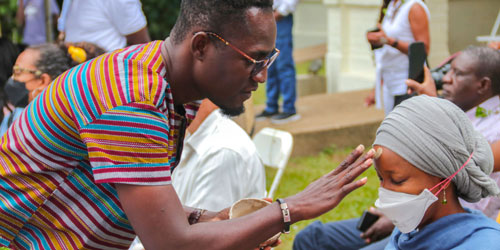MacArthur Staff and President John Palfrey reflect on and share responses to racist events and the systems that uphold it.
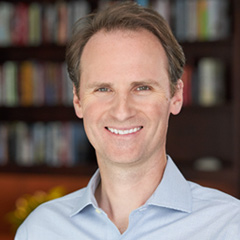
John Palfrey, President
This week, as many parts of the world began to open up from COVID-19 lockdowns, another plague made itself known yet again: our deeply engrained racism. I write to acknowledge the combination of the police-involved death of George Floyd in Minneapolis and the call to the police by Amy Cooper, a white woman in Central Park, that demonstrated, once again, that white supremacy and the practice of racial injustice remain parts of everyday life in America. These twin events, on top of the ongoing racialized harms of COVID-19, give rise to feelings of injustice, pain, and anger.
As a philanthropy devoted to creating a more just world, we wake up every day at MacArthur with the opportunity and obligation to address the structural and systemic racism that these actions reflect. As a society seeking to recover from the continuing harms of the COVID-19 pandemic, we redouble our efforts to break the harmful patterns of the past and establish new, more just, inclusive, and equitable patterns for a post-COVID-19 world. I invited colleagues from the MacArthur Foundation staff to share their perspectives on these events, this moment, and our shared mission to bring about a more just, verdant, and peaceful world.

Kathy Im, Director, Journalism and Media
These events remind me, once again, of the power of the camera and the importance of the point of view. I would rather not see these images and videos at all, but we all know that people of color have been trampled upon intentionally and insidiously for generations, without the visual evidence. And before everyone had the power of the smart phone in their hands, these stories were always recorded and told, if at all, from the point of view of those seeking to preserve their power and privilege.
Even journalists asserting their “objectivity” were largely reporting these stories from the elite, white point of view. Today, a growing cohort of digital and media savvy organizations are combining research, journalism, storytelling, advocacy, and art to reverse the damaging narratives about people of color and to create understanding and pathways toward justice and equity. This work is being done in the documentary film arena by organizations like Firelight Media and self-organized groups like Asian American Doc Network and Brown Girls Doc Mafia; through strategic online organizing and activism best exemplified by organizations like Color of Change, Define American, and IllumiNative; and by a new generation of journalism entrepreneurs, like those in our great City of Chicago: Borderless Magazine, Cicero Independiente, City Bureau, and the TRiiBE, among others. So, while I am devastated and angry about these recent events, I focus my energies into urgently supporting and promoting the work of our grantees. Because our work is not about saving the profession of journalism or supporting cinematic artistry, it is about using the tools of media to advance just and inclusive news and narratives so that everyone may equally enjoy the promise of democracy.
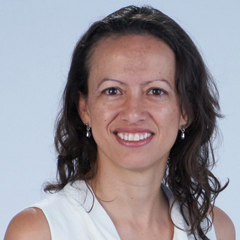
Liliane Loya, Deputy Director, Mexico Office
There is no more sense of indignation in me anymore. All that is left is pure and honest disbelief about the police-involved homicide of George Floyd. These are police, after all, who are supposedly trained and expected to adhere to standards and protocols; especially after so much disproportionate use of force against African-Americans has been documented and made visible. The only answer I can find is that police forces belong to a broader system that trains cops to do exactly what they did to Floyd: to target Black Americans and use disproportionate force. The “unconscious bias” that we often hear in discussions about systemic racism does not explain a knee to the neck/throat to a handcuffed man on the floor who is pleading “I can’t breathe.” Nothing the police commissioner can do or say can compensate for this, not even firing the police officers. These are not isolated events, but rather a product of a system in which racism is reproduced with deadly consequences.
Regarding Amy Cooper, I can only say one thing: ignorance is dangerous.
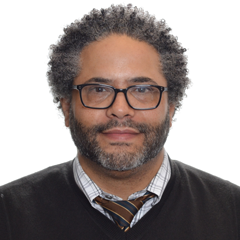
Geoffrey Banks, Program Officer, Chicago Commitment
We hear it again: “I Can't Breathe!” The police-involved death of George Floyd in Minneapolis is only the most recent example. From Amadou Diallo in New York in 1999, to Michael Brown in Ferguson in 2014, to George Floyd this week, many people continue to express surprise at dramatic scenes of overtly racist behavior repeated in the headlines. Similarly, many expressed shock during the Chicago heat wave that disproportionately affected communities of color in 1995, the crisis in African-American communities following Hurricane Katrina in 2005, and the deadly impact of COVID-19 in African-American and Latinx communities today. Incident after incident, headline after headline, why are we surprised?
Particularly in Chicago, effort is required to avoid confronting the reality of persistent racial inequality. It takes work to maintain a lack of engagement with race-related social issues. This strategic avoidance of the centrality of race is one mechanism by which modern-day racial inequality endures. As sociologist Eric Klinenberg points out, during the 1995 Chicago heat wave, a natural disaster simply revealed the underlying social disaster that was staring us in the face all along. Today’s COVID-19 crisis in black and brown Chicago neighborhoods is no different. Our dominant color-blind racial ideology sustains, rationalizes, and ultimately justifies racial inequality.
In philanthropy, there is increasing recognition of the central role that structural racism plays in the social problems that foundations are working to address. At MacArthur, I am encouraged by the Chicago Commitment program’s acknowledgement of the legacy and continued practice of systemic racism. However, we cannot expect such encouraging trends to continue on their own unattended. Structural racism is produced and reproduced by subtle, institutionalized, and apparently nonracial practices. Without a consistent and collective effort to keep racial equity at the core of our strategies, decision-making processes, and programmatic approaches, we will continue to experience racist incident after incident in headline after headline and wonder “why are we surprised?”
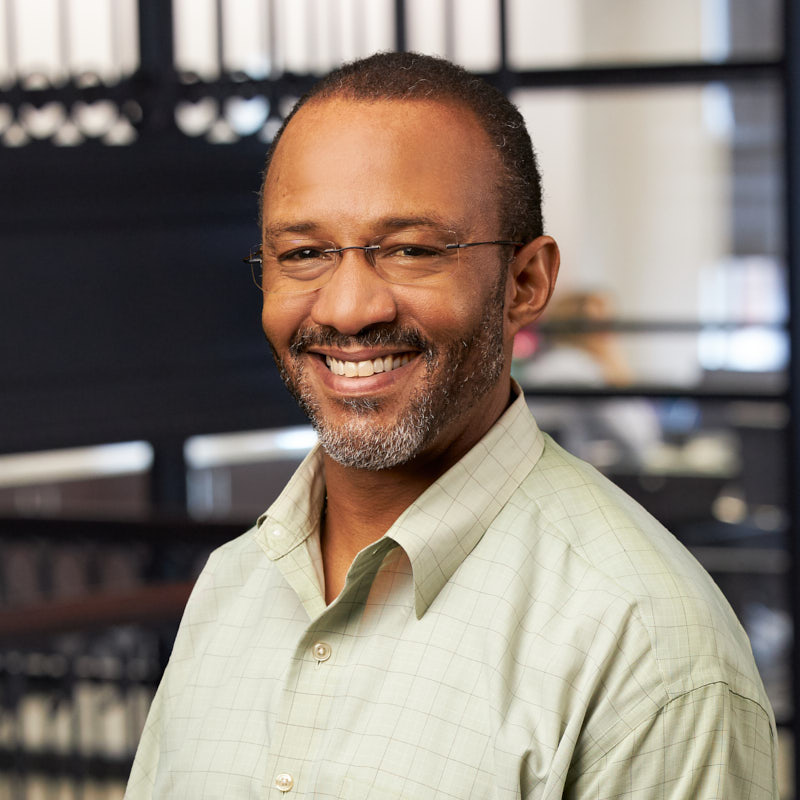
Steve Casey, Associate Director, Grants Management
One of the benefits of COVID-19 in my household has been the extended conversations with my son about COVID-19 and its impact on not just the black community but communities across the world.
As I was writing my response, Joel asked me what I was doing, and I shared with him the exercise. I then asked if he wanted to jointly write a response; instead he offered his own:
We live in a day and age where all of our issues are connected. We have tried solving racial tensions between African-Americans and whites, but we only look at how the oppressed must change in order to keep racial issues under control. As we have seen, black men have recorded these events and do everything society tells them to do, but the oppressors are not meeting us halfway. I believe the reason they feel they have no obligation to help is that they feel as though they are better than the rest of us. It’s a mindset that started before slavery. As a black community, we have been put down for hundreds of years, and it’s because parents pass the mindset down from generation to generation.
As a black male, I have a target on my back. Just as the white woman used the words “there’s an African-American man threatening my life,” she could have just said that she was being threatened. But she used “African-American man” as a trigger. This puts black people at a standstill. Everywhere we go, even in our own homes, we fear for our own lives, all due to a cycle that cannot be stopped.
Here is my offering:
Thanks John, your prompt begets many unresolved and deeply ingrained issues in our country. As COVID-19 has been a disruption worldwide, it also serves as another metaphorical “foot on the neck” of our country, especially for the world’s most economically and politically disenfranchised—people of color. Incidents like yesterday’s Tallahassee police-involved shooting, or George Floyd’s police-involved death this week, or Breonna Taylor in Kentucky from March, all serve as an ongoing shattered mirror experience of another “foot on the neck” for most African-Americans. African-Americans cannot seem to escape police terrorism, all the while managing all facets of COVID-19. It is a very disturbing and hurtful trend. It is putting undue stress on communities of color leaving a renewed feeling of anger, hurt, and deep seated fear about the missteps during this pandemic. An unnecessary toll that destroys health, relationships, and community trust for years to come.
As the father of two young black boys living in Englewood, these continuing incidents reinforce the research findings of MacArthur Fellow Raj Chetty, whose research shows that your conditions near and around you tend to frame your future possibilities. And yet, his research and my sons’ lived experience also continually force me to ponder how to break the cycle.
Our funding cannot resolve the racist actions that either rise in the moment, as displayed by Amy Cooper in New York, or are part of an structurally racist system that allows those in power to exercise their will, as demonstrated in Minneapolis this week or as seen in Georgia a few months back.
So, I implore MacArthur never to give up, let’s view these moments as a reflection of our larger society and use them to reimagine our possibilities and paths to creating a more just world.
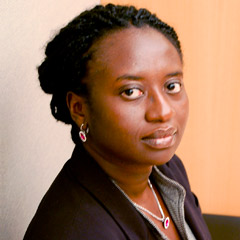
Yvonne Darkwa-Poku, Senior Program Officer, On Nigeria
I was still processing and sorting through my emotions and thoughts on the murder of Breonna Taylor and the modern-day lynching of Ahmaud Arbery, when I watched with horror, the brutal, police-led murder of George Floyd. Earlier that day, I had learned of an attempted effort to inflict potential harm on Christian Cooper in Central Park due to Amy Cooper’s decision to exploit her white privilege. I have been numb for several days—still processing my thoughts, still sorting through my emotions, while squinting to see the proverbial light at the end of this very dark, very long, and very crowded tunnel of dead bodies of innocent black men and women. You see, what many people may not realize about the crippling effects of racism is that it is a forceful psychological trap; it has the potential to kidnap your attention, rob you of your joy, trigger your anger, and hold you captive—if you allow it. As an African immigrant whose direct ancestors did not fight for the “freedoms,” civil rights, and liberties I enjoy in this country as a result of the sacrifice and bloodshed of African-Americans, I feel an even greater sense of duty and responsibility to contribute beyond charitable donations, hashtags, and re-posting of compelling quotes and images. So, as I was pondering solutions and a way forward, I was reminded of the old proverb “charity begins at home.” We are in a critical moment in time at MacArthur, with an opportunity to contribute to dismantling the structures of systemic racism through the Just Imperative. If we consciously apply the principles of justice, equity, diversity, and inclusion in our Foundation culture, grantmaking, and in our relationships beyond the Foundation, our efforts would significantly contribute to the kind of world in which we all aspire to live.



